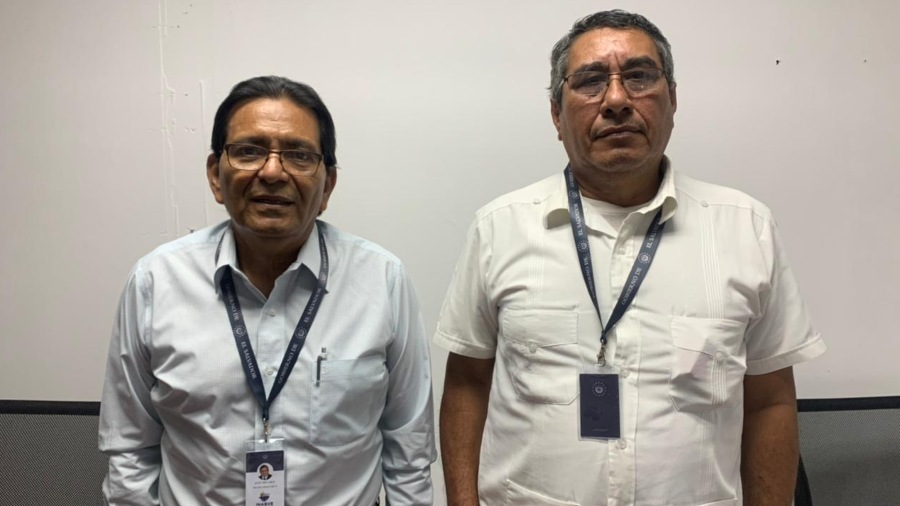
Joseph and Jesus fought the same war, but on different sides. Before 1992, they were irreconcilable enemies and today they celebrate life in a country where they have been friends for nearly three decades.
“Certainly not”. José Santos Melara, aka “Pepe”, answers with that strength, if he and Jesús Quijano could have worked hand in hand as they do now.
In 1978, “Pepe” joined the People’s Revolutionary Army (ERP), one of the five armed groups that formed the Farabundo Martí National Liberation Front (FMLN) in 1980. To his right, at the table, sits Jesús Quijano, who joined the Air Force, a branch of the Armed Forces of El Salvador (FAES), in 1986. Today, both are on the board of the Institute for the Administration of Benefits for Veterans and Veterans (INABVE). And they are friends too. But both are forceful in saying that their differences were incompatible more than 29 years ago.
That, in his view, is the main value of signing the peace, that Salvadoran brothers stopped murdering each other because of their political ideas. “The war is insane, nobody wants to go back. We want to walk the paths of democracy, peace and justice as we have walked. There is no more room in the country to fight ideas with violence, ”says Santos Melara hopefully.
But this was not easy, he explains, asking if this message reaches Salvadorans, and especially young people who sometimes take peace for granted.
Assembly declares 2021 as “the year of the bicentenary of El Salvador’s independence and of the peace accords”
“Conditions had to be created for when we could sit and there were key figures, such as the United Nations or the Catholic Church, who promoted us to stop the suffering of this people,” the ex-guerrillas recalled.
In addition, he celebrates another point: “We agreed and the most tangible evidence of this is that the agreements have been signed and there was no more shot to fight ideas.”
Jesús Quijano also emphasizes that El Salvador is an example worldwide in terms of compliance with these agreements.
“The ceasefire was not broken by either of the two protagonists,” he proudly emphasizes.
Therefore, and in the face of growing rhetoric that denies the importance of the similarities, Quijano says we need to defend them today more than ever, especially us veterans who were enemies on the battlefield, but thank goodness we got to the point of sitting down and ended the madness of January 16 ”.
A center in Washington accuses Bukele of calling the peace agreements a “matter.”
He adds that “the guns were silenced and no gun was sounded between the armed forces and the FMLN. We must protect the legacy of the peace accords because we were enemies on the battlefield and today we defend peace together ”.
And while “Pepe” and Quijano proudly highlight the story, it is impossible not to delve into the present and the risks facing peace today …
Attempts to Rewrite History
In December 2020, in the village of El Mozote, where the bloodiest massacre of the war took place, Nayib Bukele said this and the peace accords were a sham.
This sparked outrage and rejection from much of Salvadoran society, including the ex-combatant and veteran sector.
Santos Melara is blunt and affirms that Bukele “wants to erase our history and create his own”.
And without giving so many rounds, he adds that “the president is sick of the obsession with power, to become a god in the land and erase and deny the whole past.”
“The peace agreements were neither useless nor a sham,” academics and political leaders tell Bukele
For this reason, he adds, in addition to rhetorical traps and denial of the historical value of the peace deals, the president is trying to stifle the sector of ex-combatants (see separate note).
“Try to clear the history,” he repeats. “Last year the peace accords were not celebrated and there was still no pandemic. He would like to, but we are going to celebrate ”, he assures us.
Quijano agrees and remembers the old maxim that “a people who do not know their history is doomed to repeat it.”
He added that the agreements are the cornerstone that supports democracy in this country and that they must be ensured, recognizing that their flaws and limitations must be addressed as a society and not as an excuse to undo peace and freedom .
“Pepe” goes on to say that without these agreements Bukele could not have been president and emphasizes that a clear advantage is that on the day he won the election and when he took office, no one delegitimized his victory. “Variety is an advantage of the agreements,” he says.
Abuse of power
In addition to their attempt to rewrite history, they both see a dangerous deviation in Bukele’s government and a similar attitude to that in the country before the outbreak of the war in 1980.
“In the conflict, society was divided between those who are for and against something. And today, if you don’t think like them (the government), you’re the bad guy, ”Quijano complains.
According to him, the current government is leading divisive rhetoric and dangerous actions bordering on dictatorial seduction.
Santos Melara also sees media prank attempts and critical voices, situations that remind him of the repression that led him to join the ERP in 1978.
“The only step left is to fight ideas with violence. We are facing someone who sees as an enemy who does not think like him, ”he complains.
Talking to both agreements is not just about talking about history, but about discussing the present and its risks, especially from a president who flirts with authoritarianism and scorns the historic conquest of peace.
And, as in their day, they seem willing to fight for their country. “We are fighting for peace and we are ready to defend it,” said “Pepe.”